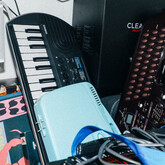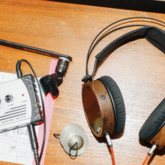
Luke Skywalker and Nintendo games consoles, a combination that most often results in deeper interests, such as Dungeons & Dragons and C++ programming. In the case of composer Jonas Valfridsson, however, tripping down this rabbit hole led to string arrangements and Stravinsky.
This past fall, composer Jonas Valfridsson's latest work, A Fragmented Memory; My Overgrown Little Tree House, premiered in his hometown of Jönköping, Sweden. The piece was commissioned for the town's new cultural center, Spira, and two years ago, when Jonas was asked to compose a piece about the town in which he grew up, he wasn't sure where to begin.
"It was pretty bare, with anonymous gas stations and video stores. But when I began to recall a little more, and remembered how I used to build tree houses in the woods, I found an emotional connection to the town," he explains.
Despite the title, Jonas likes to point out that it's not a nostalgic and nature romantic piece of music.
"I was pretty shy as a child, preferring to stay indoors, playing video games and watching movies. Nature was a little scary, and this sentiment provides the underlying tone for the piece."
The step from building tree houses in the woods of Jönköping to composing art music that wins awards in international cities like Tokyo may seem a bit of a stretch. Jonas' journey from tree house to concert hall began in his bedroom, where as a 13-year-old he sat obsessively learning the guitar riffs from Metallica's The Black Album.
A few years later, his extreme music focus remained, but the guitar had been put aside in favor of composition notebooks.
"At high school, I realized I was more interested in writing music than playing it. That was when I got into art music via pretty advanced movie and video game scores." Movies such as Star Wars and A Nightmare Before Christmas aroused Jonas' curiosity for art music. When he later discovered that essentially every piece he admired was inspired by two of the twentieth century's most influential composers, Stravinsky and Ravel, he was, as he phrases it, a 'total convert'.
"I had a very analytical approach to music, which separated me from my classmates. You don't really see that in rock and pop music. Within such genres, people are happy to analyze the artists and their roots, but they're not as interested in analyzing the actual music."
You mean it's more important to know that Bruce Springsteen comes from New Jersey than to understand the theory behind his chord progressions?
"My understanding is that people in rock and pop are very keen on authenticity and feel that too much analysis spoils the experience. Music journalists seldom dissect the latest hits in terms of music theory. But that's what I wanted to do, and it's quite acceptable in art music."
Could one of the reasons art musicians are often relatively unknown be the strong focus on the piece rather than the composer?
"Yes, especially in Sweden, and that's a problem. I envy, for example, the literary world in this respect. Swedish authors such as Jonas Hassen Khemiri become superstars while the general public can't name a single contemporary Swedish composer. It's like there's no room for that."
Jonas sits and explains the anonymous composer's workaday life in an anonymous studio located in a relatively anonymous part of Stockholm. He's dressed in a white shirt, black suit, and black tie. Perhaps it's a coincidence – or perhaps not – that this is the same outfit in which Quentin Tarantino dressed his characters in cult movie Reservoir Dogs to highlight their anonymity. Jonas, though, doesn't sound bitter when talking about the state of art music in Sweden; more like he’s presenting the sober truth of the prevailing situation.
"Art music isn't included in our basic schooling. It would be embarrassing to not know about Swedish authors Moa Martinsson and August Strindberg, but that's not the case with art music. Similarly, we are also well acquainted with popular culture, where instead it's embarrassing to not know about The XX and Breaking Bad."
Jonas studied at the Conservatoire de Paris in the 19th arrondissement of Paris, France and spent a year in Bamberg, Germany composing on a work stipend received from Internationales Künstlerhaus Villa Concordia. He feels that attitudes toward art music in other countries differ greatly from those in Sweden.
"There's much greater interest in art music in Central Europe. I studied for nine years and, for some time after I completed my studies, my work was only played overseas. My work was played in Manchester, Tokyo, and Paris – but never Stockholm."
The work stipend Jonas received from Internationales Künstlerhaus Villa Concordia enabled him to live in a baroque palace – at no cost – and to compose freely for an entire year.
"When they first asked whether I was interested, I thought it was a fraudulent spam e-mail. In Sweden, the idea would be completely absurd; to trust that giving an artist some money and a place to live will result in the artist producing work. That’s simply not part of the program."
"In Germany, I got to experience being a full-time professional and managing my own time. How much I worked, how much I drank beer, and so on. It was important to me."
One of the lessons Jonas learned from the German baroque palace is the reason we're sitting talking in his studio rather than at his kitchen table. Basically, a simple piano, a computer, and a composition notebook are all that’s needed to compose, but having a workplace is important to Jonas.
"It's more like a regular existence. If I go to the office and work, it's also easier to leave work behind when I go home. It's also about gaining respect from others, to be able to say to friends and your girlfriend that you're at work."
The city that never used to play his music has now opened its arms and next year the New Stockholm Chamber Orchestra will perform a new work by Jonas. In order to afford both an apartment and a studio in the Swedish capital, for a long time Jonas worked as a care assistant alongside composing. As he receives increasingly more commissions, he's able to focus solely on his music.
"At the moment, it's mostly orchestras that are interested. I've gained something of a reputation for making orchestral music and so orchestral pieces will be what I produce for the time being."
How does the commission process work?
"Orchestras usually e-mail and ask whether I have time to write something new for them and I say yes. Always yes. Then the orchestra applies for funding, such as from the Swedish Arts Grants Committee, in order to pay me. These days, I compose almost solely on commission. I have to prioritize work that pays, otherwise I'd go bankrupt."
Writing commissioned pieces can be difficult, especially when inspiration is hard to come by and the deadline is approaching. Then you have to rely on your education and training, says Jonas.
"To cope with being a composer, you have to learn to work without inspiration. It requires discipline and routine. You have to soldier on. That's why I have the studio. I go to work and compose from ten in the morning until one in the afternoon before I allow myself to do anything else."
Didn’t the author Jan Guillou say that inspiration was for amateurs?
"Exactly, you can't rely on inspiration coinciding with your workday."
It took Jonas six months of disciplined work to write the 20-minute piece for Jönköping's concert hall. According to Jonas, when you've worked with a project so intensively and for so long, handing over the finished product is an emotional event.
"Handing over the piece to a conductor is the most emotionally charged situation for a composer. Most times, I attend a rehearsal before the opening night, as it's usually much quieter than a public concert. At that point, I've worked with the piece for six months and finally get to hear everything just as I've imagined it."
How much does the conductor influence how the music finally sounds?
"There's quite a bit of room for interpretation, even if only for the subtleties. With my music, you can infuse much of your own personality. Conductors occasionally get in touch with questions, but I usually have no comments. You shouldn't hold on too tightly to your work, that's like not letting your children grow up, as one of my teachers phrased it."
Before, composer and conductor were often one and the same, but as society has become more specialized, the combination is no longer as common. Jonas is completely satisfied with being a composer and has no future plans to pick up a conducting baton.
"Although Stravinsky always said that he thought composers should conduct, because conductors receive much better pay."
Text: Anders Löf
Photo: Viktor Gårdsäter


